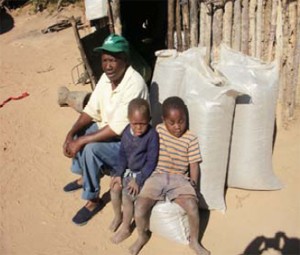
Lucas Kaseke lives with his wife, children, and four grandchildren in Gwezere Village in Bindura district, located in northeast Zimbabwe. Kaseke is a farmer, and in recent years the family of eight has struggled to get by due to drought and difficult economic conditions. This year, however, things are looking up thanks to the USAID-sponsored Africare Mashonaland Livelihoods Program.
Under the program, Africare, using USAID funding, provided 5,500 households (33,000 vulnerable people) with agricultural supplies including two kilos of sunflower seed, 25 kilos of fertil-izer and a supply of sweet potato vines.
As a result, most of the rural farmers in Bindura will not need to buy cooking oil until the next harvest in April 2011. In addition, they will also make an average of $400 from the sale of cooking oil and sunflower cake, which is used to feed animals.
Kaseke was delighted to have the supplies. Without them, he said, "I would have used retained seed, which does not yield as much oil as the new seed provided by Africare." Kaseke noted that the new sunflower seeds yielded 10 bags of grain, compared to four using his own stock. He also appreciated the fertilizer, which he could not have afforded on his own.
The greater seed yield translated to higher yield in oil. "When I took the grain for oil pressing, I realized the seed variety has a better oil content than my retained seed crop. One bucket of sunflower grain produces four liters of oil, compared to 2 liters from retained seed," he explained.
With the higher yield, Kaseke said he will not only save money that would have gone to buy household oil, but also expects to realize $395 in profits from the sale of cooking oil and sunflower cake.
Kaseke is looking to expand his agriculture portfolio for future years and, due to the agricultural supplies he received from USAID, anticipates having money to invest in pigs and a sweet potato nursery.







Comment
Make a general inquiry or suggest an improvement.